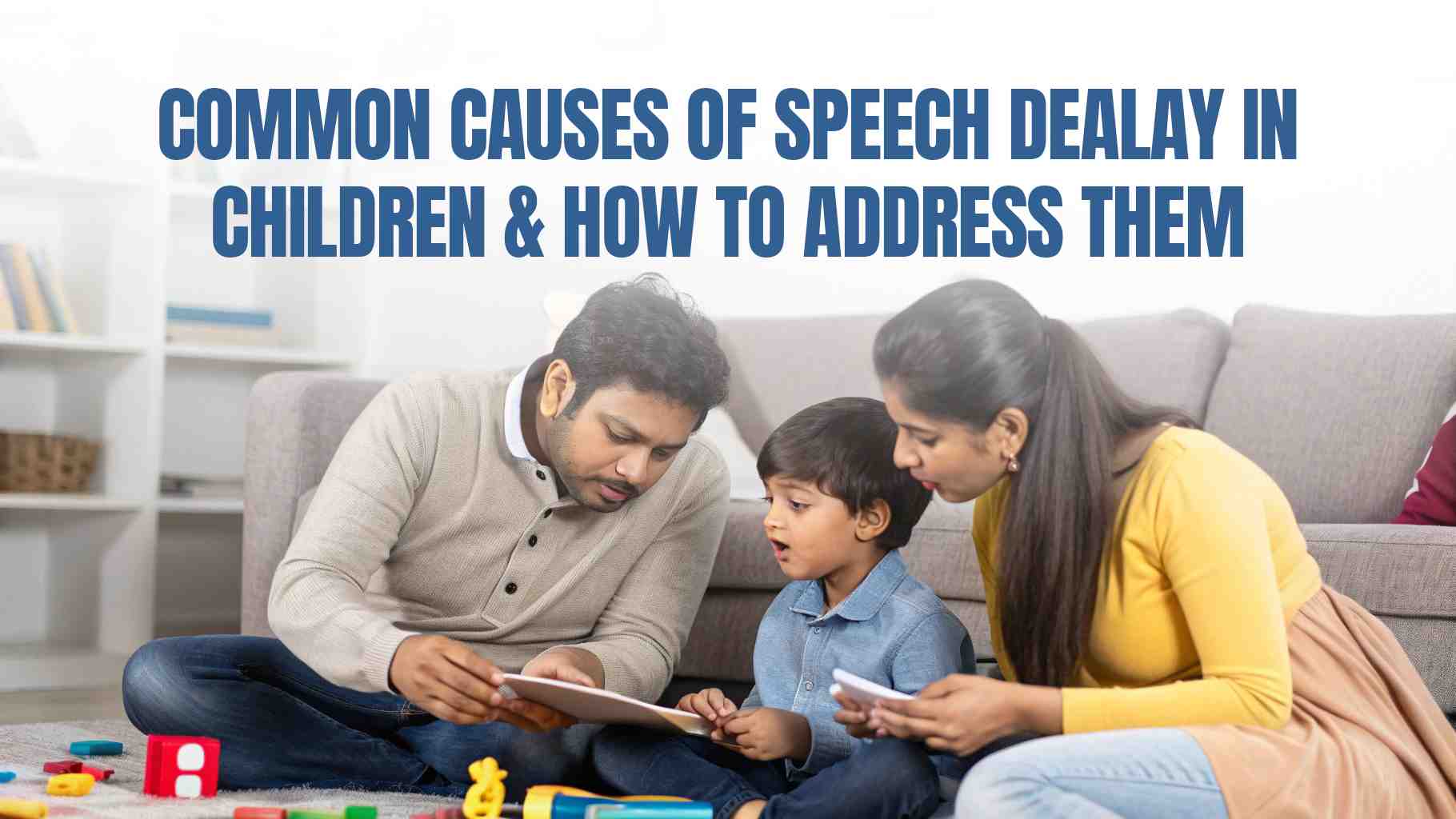Common Causes of Speech Delay in Children and How to Address Them
Verified By Dr. Madhu Khurana | 28-Apr-2025
Speech and language development is vital in a child’s early years. While some variation in development is normal, noticeable speech delays may signal an underlying concern. As Dr. Madhu Khurana, an experienced Occupational Therapist, I’ve seen how early support and intervention can significantly help children facing speech delays.
In this blog, we explore the common causes of speech delay in children, warning signs to look for, and practical strategies to address them.
Table of content
Speech delay occurs when a child does not develop speech skills at the typical age. While every child progresses differently, certain milestones help us determine if development is on track. It’s essential to differentiate between speech delay (difficulty forming words/sounds) and language delay (difficulty understanding or using language).
| Age |
Typical Milestones |
| By 12 months |
Babbles, responds to name, tries to imitate sounds |
| By 18 months |
Uses 10–20 words, points to familiar objects |
| By 2 years |
Combines two words ("more milk"), follows simple directions |
| By 3 years |
Speaks in short sentences, speech is mostly understandable |
| By 4 years |
Uses full sentences, clear speech to unfamiliar listeners |
If your child is significantly behind on these, it may be time for professional support.
Also read: Why Kids Today Have More Anxiety Than Ever Before
1. Hearing Problems
Hearing is crucial for speech. If a child cannot hear words and sounds properly, they may struggle to learn how to speak.
Warning Signs:
- No response to sound: The child may not turn their head or react when called or when loud noises occur.
- Inconsistent reactions to name: Sometimes the child might respond, and other times not, indicating fluctuating hearing ability.
- Very loud or soft speech: The child may talk unusually loudly or quietly because they can’t gauge their own volume.
🩺 Tip by Dr.Madhu Khurana: “Always get your child’s hearing tested early—it’s a vital first step.”
2. Autism Spectrum Disorder (ASD)
Children with autism often face challenges in communication. Speech delay is usually one of the early signs.
Additional Symptoms:
- Lack of eye contact: Difficulty maintaining social gaze, avoiding looking at people’s faces.
- Avoids gestures like pointing or waving: Limited non-verbal communication reduces interaction opportunities.
- Repetitive behaviors: Engaging in the same movements or sounds repeatedly, showing focused interests.
✅ Early diagnosis and therapies like speech and occupational therapy can greatly help.
3. Oral-Motor Issues
Sometimes, children have difficulty controlling the muscles needed for speech due to oral-motor dysfunction.
Signs Include:
- Trouble chewing or swallowing: Difficulty managing food textures or excessive coughing during meals.
- Excessive drooling: Poor lip closure or tongue control can cause drooling beyond typical age.
- Difficulty moving the tongue or lips: Affects the child’s ability to produce clear sounds and words.
🎯 Therapist Insight: “Oral-motor therapy can help strengthen muscles needed for clear speech.”
4. Developmental Delays
Children with overall developmental delays may have trouble with speech, language, and learning.
Common Signs:
- Late walking, sitting, or crawling: Motor delays often coincide with speech delays.
- Poor understanding of instructions: Difficulty processing and following simple commands.
- Limited interaction with surroundings: Less curiosity or social engagement than typical peers.
A multi-disciplinary team can support the child’s overall development.
5. Environmental Factors
A child’s environment plays a huge role in speech development. Lack of interaction or stimulation can delay speech.
Risk Factors:
- Excessive screen time: Passive viewing reduces opportunities for active communication and social learning.
- Caregiver inattention: Less talking, reading, or playing with the child limits exposure to language.
- Limited social interaction: Isolation or lack of playmates reduces practice in verbal skills.
Advice from Dr. Madhu Khurana: “Read to your child, engage in daily conversations, and reduce passive screen exposure.”
6. Emotional and Psychological Factors
Children who are anxious, shy, or have experienced trauma may show speech delays.
Warning Signs:
- Regression in speech: Losing previously learned words or stopping to speak.
- Reluctance to speak: Avoids talking even with familiar people.
- Avoiding social interaction: Prefers to be alone or seems fearful around others.
Addressing emotional health through child psychology and occupational therapy can build confidence.
7. Multilingual Households
Growing up with multiple languages can slightly delay speech—but this is often temporary.
Caution: If your child has difficulty understanding any language by age 3, consult a professional.
Focus on one primary language to start and expand gradually.
Talk to your doctor or therapist if your child:
- Isn’t babbling by 12 months
- Says no words by 18 months
- Can’t follow basic instructions by age 2
- Struggles to make themselves understood by age 3
- Loses previously learned speech skills
In such cases, it’s important to consult with a team of specialists for a comprehensive evaluation. Your pediatrician may refer you to:
- A Speech-Language Pathologist for detailed speech and language assessment
- An Audiologist to check for underlying hearing issues
- A Pediatric Neurologist for overall developmental screening
- An Occupational Therapist for sensory and motor integration therapy
- A Pediatric Neurologist if there are signs of neurological involvement such as seizures, muscle weakness, developmental regression, or if speech delay is accompanied by other cognitive or motor delays
Also read: Caring for Premature Babies at Home: Tips for New Parents
1. Get a Professional Evaluation
Start with your pediatrician, who may refer you to:
- A Speech-Language Pathologist for assessment and therapy.
- An Audiologist to check for hearing issues.
- A Pediatric Neurologist for broader evaluation.
- An Occupational Therapist for support with sensory and motor skills.
Occupational Therapy helps improve attention, sensory processing, and oral-motor control.
2. Role of Pediatric Neurologist:
A Pediatric Neurologist plays a vital role in identifying whether neurological conditions—such as cerebral palsy, epilepsy, or neurogenetic disorders—may be contributing to a child’s speech delay. At Kailash Hospitals, our pediatric neurology team works closely with therapists and developmental specialists to create a coordinated care plan that supports the child’s brain and communication development holistically. Early neurological assessment ensures timely diagnosis and appropriate intervention, which can significantly improve long-term outcomes.
3. Occupational Therapy
Occupational therapy complements speech therapy by focusing on:
- Muscle control and coordination: Strengthening muscles needed for speech clarity.
- Attention span and focus: Improving the child’s ability to engage in therapy and learning.
- Sensory integration: Helping children better process sounds and sensations.
Dr. Madhu Khurana: “Through playful, child-friendly exercises, we lay the foundation for better communication.”
4. Engage at Home
Your involvement as a parent is vital:
- Talk to your child often about daily routines: Narrate your actions and encourage responses.
- Read picture books and ask open-ended questions: Stimulate thinking and language use.
- Play games that encourage talking: Activities like “Simon Says,” naming animals, or describing objects promote vocabulary.
- Sing songs and rhymes together: Music aids memory and speech rhythm.
5. Limit Screen Time
Avoid phones and tablets, especially under age 3. Encourage imaginative and social play instead, which fosters natural communication skills.
6. Enroll in Early Intervention Programs
At Kailash Hospitals, we offer comprehensive early intervention programs designed to support children with developmental delays or challenges. Our services include speech therapy, occupational therapy, and special education support, all provided by experienced professionals in a child-friendly environment. Early intervention can significantly improve a child’s communication, motor skills, and learning abilities. The sooner support begins, the better the outcomes—so don’t wait to seek help.
Also read: How to Handle Anxiety in Children?
Speech delays are more common than you might think—and with the right support, they are highly manageable. Don’t wait for your child to "outgrow it" if you notice persistent signs.
From Dr. Madhu Khurana, Occupational Therapist: “Every child deserves the chance to communicate confidently. With early intervention, patience, and the right guidance, we can help them find their voice.”



 +91-9711918451
+91-9711918451
 international.marketing@kailashhealthcare.com
international.marketing@kailashhealthcare.com







